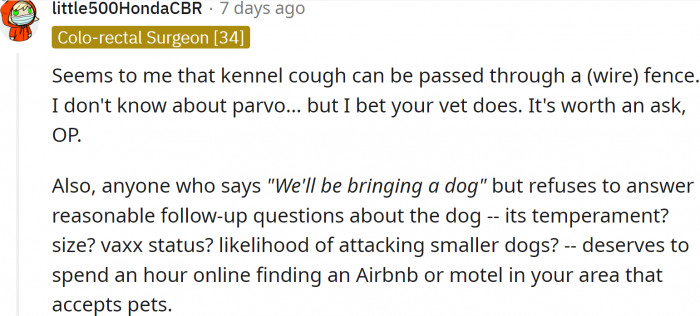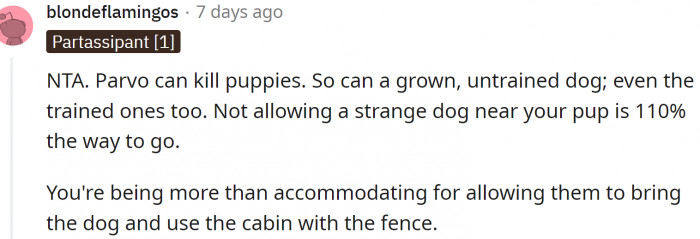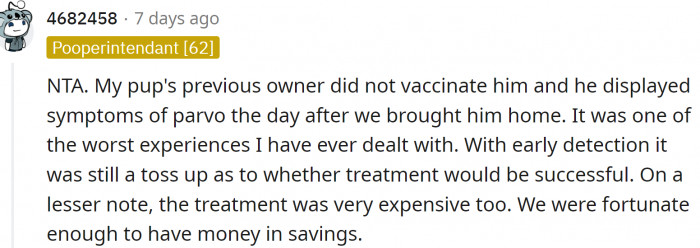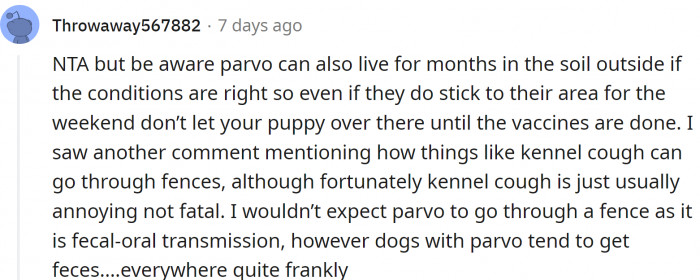Woman Asks Questions About The Dog Her Stepdaughter Wants To Bring To The Property, But The Stepdaughter Gets Offended
Having people over always requires work and preparation, especially if they have kids or pets. The responsible thing to do is always to ask if the host would mind. And if they ask questions, you should answer them.
“I’ll bring my dog over” is not really full information. What breed is it? Is it calm? Is it comfortable around strangers and in unfamiliar homes? These are the questions in every host’s mind, but not many ask them out of politeness.
However, when it is family, you don’t need to be so polite because you are among your own, right? You can freely ask some questions without worrying that the other person will be offended, especially if it’s your child.
Well, some people don’t like questions, even if they come from their parents (for some people, it’s especially when they come from their parents). We have one such story today. It was posted by a married elderly woman who just got a puppy.
And the puppy is still not fully vaccinated, making it susceptible to infectious diseases. Vets recommend that any puppy that isn’t fully vaccinated avoid contact with other animals.
That was OP’s concern because her husband’s daughter wanted to come for a longer stay with her boyfriend and his dog. When OP's husband asked about the dog—what it is like, if it is vaccinated, and similar questions—the daughter got offended.
"My husband told his daughter that they could bring the dog, but it wouldn’t be allowed in our house or in our little fenced yard in order to keep our puppy safe and healthy. Parvo is rampant in our area, and we are not willing to take any chances since the puppy hasn’t had all of his shots.
We have two cabins, and one has a fenced yard where the daughter, boyfriend, and dog can stay for the weekend. The daughter has refused to give us any information about the dog they want to bring here and is offended that we would ask such probing questions."
Read this interesting story below:
OP asks:

She and her husband have a puppy that's not fully vaccinated yet. Her stepdaughter wants to bring her boyfriend and his dog for a visit.

Her husband told his daughter they could use the other cabin on their property, but that wasn't good enough for her.

Addressing Concerns About Pet Health
Dr. Maria Lopez, a veterinarian, emphasizes that health concerns, such as parvo, are valid reasons for hesitation regarding pet adoption or care.
Research shows that understanding the potential health risks associated with pets can help families make informed decisions.
Addressing these concerns openly can prevent misunderstandings and emotional distress when integrating new pets into a household.
The Role of Emotional Attachment in Pet Ownership
When a stepdaughter's desire to bring a pet into a shared living space is met with resistance, it often reflects deeper emotional concerns. Research indicates that emotional attachments to pets can create intense feelings of protectiveness and anxiety about their well-being. In this case, the mother's concern about the puppy's health highlights her protective instincts, which are rooted in love and a desire for safety.
Understanding these emotional dynamics is crucial for navigating conflicts about pet ownership, as they can reveal underlying values and priorities.
Redditors agree that these are reasonable questions

Parvo is really dangerous

What's with the secrecy?

A clinical psychologist highlights that feelings of offense in response to health-related inquiries may indicate a deeper emotional investment in the pet.
Studies suggest that individuals often view their pets as family members, leading to heightened emotional responses when their pet choices are questioned.
Recognizing this emotional connection can facilitate more compassionate conversations about pet health and safety.
From a psychological perspective, the introduction of a new pet into a household can evoke a range of reactions based on personal experiences and beliefs. Studies show that individuals often project their fears and anxieties onto pets, leading to heightened sensitivity around issues like vaccination and health risks. These reactions are often tied to a desire for control and security in uncertain situations.
Parvo hangs around

Redditors who had puppies with parvo agree:

It can survive outside for several months

Strategies for Open Communication
Experts recommend fostering an environment of open communication regarding pet health and safety.
Creating a space where all concerns are voiced and respected can lead to better understanding and collaboration.
Utilizing educational resources about pet health can also empower families to make informed decisions together.
The Importance of Open Communication and Compromise
Engaging in open discussions about the implications of bringing a pet into the home can help resolve conflicts. Research indicates that fostering an environment where all parties can express their feelings and concerns is essential for collaboration. By addressing fears and anxieties around pet ownership, families can work towards finding common ground and understanding each other’s perspectives.
Encouraging compromise, such as agreeing to specific health checks or vaccinations, can also alleviate concerns while allowing the stepdaughter to feel heard and valued.
OP posted an update:

What is parvo? All dogs are susceptible to the extremely infectious canine parvovirus; however, puppies and dogs without vaccinations under the age of four months are particularly at risk.
The virus affects the digestive systems of dogs and is transferred by direct contact between canines as well as through contact with infected surroundings, humans, or excrement (stool).
Infected dog handlers' hands, clothing, food and water bowls, collars, and kennel floors can all become contaminated with the virus. It can last for a long time in the environment and is resistant to heat, cold, humidity, and dryness.
Moreover, exploring the motivations behind the stepdaughter's desire for a pet can provide valuable insights. Understanding whether the wish to bring a puppy stems from emotional needs, companionship, or a sense of responsibility can guide family discussions toward more compassionate outcomes.
Practical Strategies for Family Discussions
Implementing family meetings can facilitate open conversations about pet ownership. Establishing a structured approach to discussing each member's concerns and suggestions can promote understanding and collaboration. Utilizing a mediator, such as a family therapist, can provide support in navigating these emotionally charged discussions.
Ultimately, the goal should be to foster a supportive environment that respects the emotional needs of all family members while addressing the practical considerations of pet ownership.
In conclusion, navigating the complexities of pet ownership in blended families requires careful consideration of emotional needs and open communication. By fostering understanding and collaboration, families can work toward decisions that honor the well-being of both the pet and all family members involved.
Psychological Analysis
This situation highlights the emotional complexities involved in introducing new pets into blended families. The concerns about health and safety reflect deeper values around protectiveness and care. Engaging in open dialogue and fostering understanding can help families navigate these challenges effectively.
Analysis generated by AI
Analysis & Alternative Approaches
In summary, the desire to bring a new pet into a blended family can evoke strong emotions and conflicts. Open communication and compromise are essential for navigating these complexities while ensuring that the needs of all family members, including the pet, are respected and valued.
Analysis & Alternative Approaches
Concerns about pet health can evoke strong emotions, necessitating careful communication and understanding.
According to research from veterinary health journals, addressing these issues collaboratively can enhance family dynamics and ensure the well-being of pets.
By fostering open dialogue, families can navigate these challenges more effectively.



